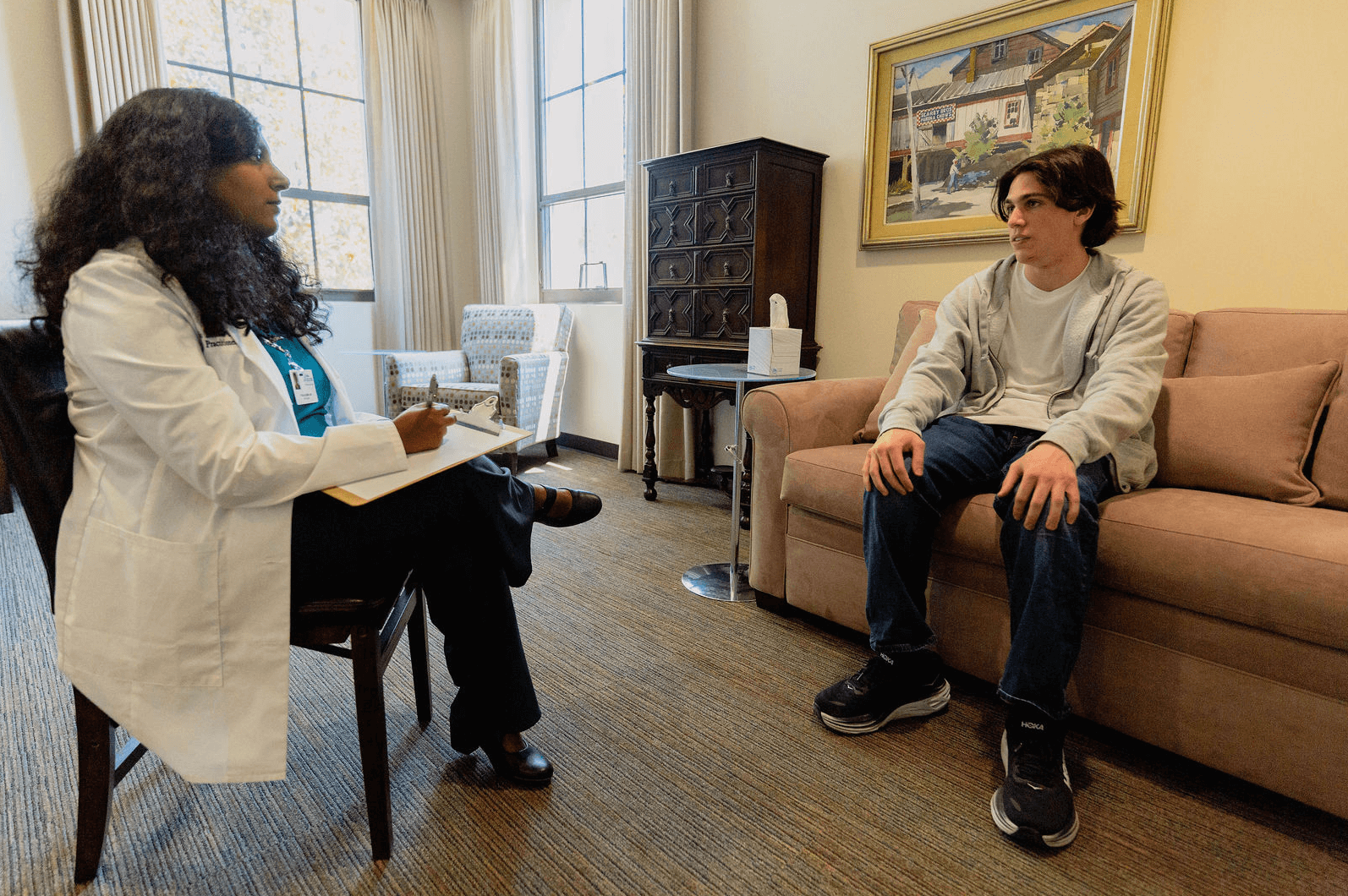
Discover the Benefits of a Nursing Degree From USD
The information in this blog post is for informational purposes only and is not intended to replace medical, financial, or professional advice.
Request more information about USD School of Nursing>>
Earning an advanced nursing degree can open doors to exciting career opportunities, higher salaries, and the ability to expand your scope of practice in areas that matter most to you.
But when it comes to terminal nursing degrees, you have more than one option. So how do you decide which path is right for you?
Let’s break down your choices and help you determine which degree will best support your nursing career goals.
What Is a Doctor of Nursing Practice (DNP)?
Similarities Between Earning a DNP vs. a PhD in Nursing
Differences Between Earning a DNP vs. PhD in Nursing
PhD in Nursing Salary and Career Outlook
DNP or a PhD in Nursing: How to Choose
What Is a Doctor of Nursing Practice (DNP)?
A Doctor of Nursing Practice degree applies evidence-based research directly to patient care, with the goal of improving patient outcomes. DNP students are typically current or aspiring healthcare leaders, often working in or pursuing roles in health policy, administration, or advanced clinical practice. They are focused on navigating healthcare organizations to drive improvements in both patient outcomes and healthcare policies.The DNP curriculum builds on the seven steps of evidence-based practice and often includes finance coursework covering the business side of nursing. It also requires clinical hours — unlike PhD programs.
Key DNP program outcomes typically include:
- Advanced clinical practice,
- Leadership in policy development,
- Critical appraisal of research, and
- Designing healthcare systems that meet societal needs and ensure quality outcomes.
DNP graduates also integrate ethical, legal, and regulatory guidelines in practice, with a focus on population health and prevention at all levels.
Earning a DNP opens doors to increased earning potential and senior leadership opportunities. Graduates often take on more significant responsibilities as advanced practice nurse practitioners, educators, or nurse administrators.
If you choose this advanced practice route, you can specialize in areas such as family care, gerontology, or psychiatric mental health, depending on your interests and career goals. Regardless of your focus, you’ll be trained to deliver the best possible care to the patient populations you are most passionate about.
For those who already have a Master of Science in Nursing (MSN), enrolling in an MSN to DNP program will help you build on your clinical expertise and advance to the next level of nursing practice. If you have a BSN, a BSN to DNP program offers a fast track to becoming an advanced practice nursing professional.
Additionally, the American Association of Colleges of Nursing (AACN) has established guidelines requiring all APRNs to hold a Doctor of Nursing Practice (DNP) degree by 2025.
What Is a PhD in Nursing?
A PhD in nursing focuses on generating new knowledge through advanced statistical analysis, qualitative and quantitative research, and a dissertation that explores how findings can be applied to broader populations. The goal is to shape healthcare and improve patient outcomes through new evidence-based research and further studies.
The focus of a PhD in nursing will depend on your interests. Common dissertation areas include:
- Nursing education
- Health policy and leadership
- Nursing science and research
- Global and public health
- Nursing informatics
- Mental health and behavioral science
- Women’s health
- Community and rural health nursing
This degree is ideal for nurses who are passionate about conducting research or aspire to become nursing faculty. Graduates think critically, conduct research, and thrive as collaborators and principal investigators on interdisciplinary teams. They also develop leadership skills to influence health policy and advocate for social justice at local, national, and global levels.
If you have a strong desire to be an independent thinker, investigate original research, and make a substantial contribution to healthcare knowledge and policy, a PhD in Nursing will help you achieve those career goals.
Students gain a solid foundation in scientific inquiry, focusing on clinically relevant areas for research. You'll conduct studies, analyze data, publish your work, and lead advancements in both science and technology to further develop the nursing profession. Opportunities also exist to train future nurses by designing curricula, delivering lectures, evaluating program outcomes, and publishing scholarly work.
Similarities Between Earning a DNP vs. a PhD in Nursing
The DNP and PhD in Nursing are terminal degrees representing the highest level of education in the field. While pursuing one does not preclude the possibility of obtaining the other, many nurses in leadership and academic positions hold both degrees.
Both degrees signify extensive expertise and advanced knowledge in nursing, requiring a significant time commitment to coursework, research, and applied learning. These programs are often available in both full-time and part-time formats. While it is possible to work while pursuing either degree, enrolling full-time is generally recommended, as it enables students to focus exclusively on their studies.
Both programs require a final project: a DNP typically culminates in a capstone project, while a PhD in Nursing involves conducting original research and writing a dissertation. Graduates of both degrees often take on leadership roles in healthcare, academia, policy, or research settings.
Differences Between Earning a DNP vs. PhD in Nursing
While both the DNP and PhD in Nursing are terminal degrees that provide extensive knowledge and prepare you for leadership roles in nursing, they differ in terms of focus, curriculum, and program outcomes.
| PhD | DNP | |
| Program of Study | Terminal research degree in nursing science to conduct research to advance the science of nursing | Terminal practice degree in nursing to improve health outcomes and translate research into practice |
| Curriculum Focus | Commitment to research career | Commitment to practice career |
| Practice Hours | None | 1,000 hours of clinically focused learning |
| Practice Project | No | Yes |
| Research Dissertation | Yes | No |
| Duration if attending full-time | 4-5 years | 2-3 years |
| Program Outcomes | Contribute to health and healthcare improvements through the development of new knowledge and dissemination of results | Contribute to health and healthcare improvements through advanced practice and leadership |
DNP Salary and Career Outlook
A Doctor of Nursing Practice can significantly increase your earning potential, though the exact salary will depend on your specific role. On average, DNP-prepared nurses earn around $117,859 annually, with most salaries ranging from $94,500 to $134,500.
Some of the more in-demand roles available with a DNP include:
- Family Nurse Practitioner — Provides family-focused primary care across all ages, from infants to seniors.
- Pediatric Nurse Practitioner — Specializes in infant, child, and adolescent care.
- Chief Nursing Officer — A senior leadership position responsible for overseeing nurse operations at the executive level.
- Clinical Nurse Leader — Focuses on coordinating patient care and improving quality at the unit level.
- Nurse Administrator/Executive — Oversees nursing operations, manages staff, and helps shape healthcare policies to improve patient care and organizational efficiency.
Nurse practitioners are in especially high demand, even listed as the #1 job of 2025 in a recent report from U.S. News & World Report with a salary range of $106,960–$140,610.
PhD in Nursing Salary and Career Outlook
Salaries for PhD-prepared nurses will also vary based on your specific role, job responsibilities, how much experience or education is required, and location. The average annual salary is around $108,675 with a range between $83,000 and $125,500.
Some of the more in-demand roles available with a PhD include:
- Nursing Faculty/Professor: Teaches and mentors nursing students at a college or university, conducts research, and contributes to the advancement of nursing education.
- Nursing Scientist: Engages in research to generate new knowledge aimed at improving patient care, policies, and nursing practices.
- Director of Nursing Research: Leads research initiatives, develops strategies, and oversees projects to improve healthcare outcomes.
- Nursing Informatics Specialist: Uses technology and data analysis to improve healthcare delivery and nursing practice.
- Community Health Program Director: Designs, implements, and manages programs aimed at improving public health.
The demand for nursing faculty is expected to grow due to a shortage of nursing instructors and an increasing number of nursing students. The job outlook for medical scientists, which includes nursing scientists, is strong, with an 11% increase in employment projected between 2023 and 2033.
Informatics roles are growing as the field of nursing informatics expands rapidly, and senior-level directors are in high demand due to the increasing need for effective nursing leadership.
DNP or a PhD in Nursing: How to Choose
Ready to explore your options? Here are some important factors to consider when choosing between the DNP and PhD in Nursing.
- Academic interests and strengths: Are you drawn more to clinical practice? If so, a DNP might be the better route. However, if you're passionate about exploring new ideas and conducting original research, a PhD is likely the right choice.
- Program structure: DNP programs are generally more practice-focused, while PhD programs tend to be more research-intensive.
- Career goals: Consider your long-term career objectives — whether you want to work directly with patients, lead healthcare initiatives, or contribute to nursing research and education.
- Degree requirements: Every program is unique, so it’s important to review the specific prerequisites and coursework to ensure they align with your background and goals.
If you’re still having trouble deciding, it can be helpful to consult with a program’s faculty to learn more about each degree and determine which best aligns with your interests and goals.

Shape the Future of Nursing at USD’s Hahn School of Nursing and Health Science
Whether you’re considering earning a DNP or PhD, we invite you to explore the University of San Diego’s Hahn School of Nursing and Health Science.
We prepare the next generation of nurse scientists, leaders, advanced clinicians, and informaticists to address humanity's most urgent needs — with compassion and intellectual discipline. Through a blend of comprehensive academics, state-of-the-art technology, and a culture of compassion, we provide an education that balances technical skills with the kind of nursing excellence that’s hard to define but easy to recognize.
If you're drawn to the Doctor of Nursing Practice, our program is tailored for those who aspire to lead change in clinical practice. Designed for visionary nurses, it provides the expertise and skills to transform healthcare and improve patient outcomes.
Conversely, our PhD in Nursing program provides an opportunity to drive innovation through research. It empowers you to become a leader in nursing science, advancing the profession through rigorous inquiry and groundbreaking discoveries.
The information provided by USD’s Hahn School of Nursing and Health Science is for informational purposes only and is not intended to replace professional medical or financial advice. This includes, but is not limited to, blog posts, eBooks, webinars, emails, graphics, social media posts, and other content. Always seek the guidance of your physician or a qualified medical or financial professional.
A Guide to Achieving the Doctor of Nursing Practice at USD
Our DNP program prepares nurses at the highest level of proficiency as they learn to translate science into clinical practice. Download the guide to learn about clinical placements, get answers to FAQs, and read about options to help finance your graduate nursing degree.
GET THE GUIDE








